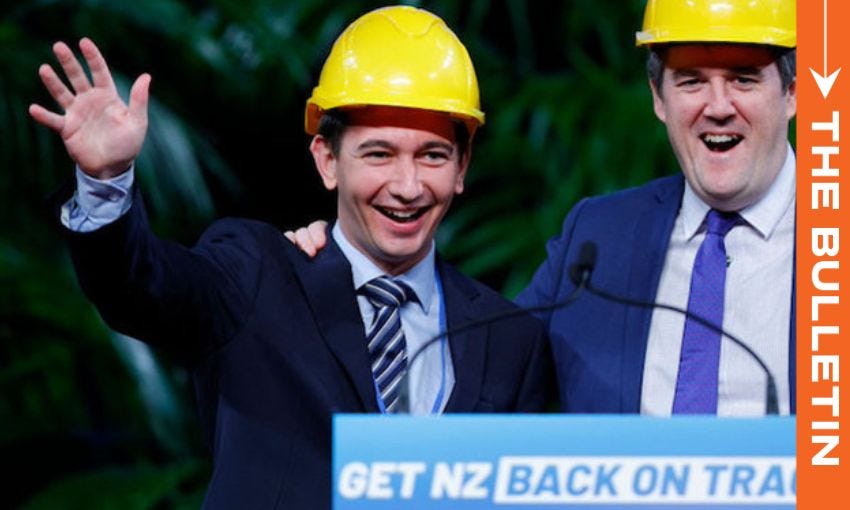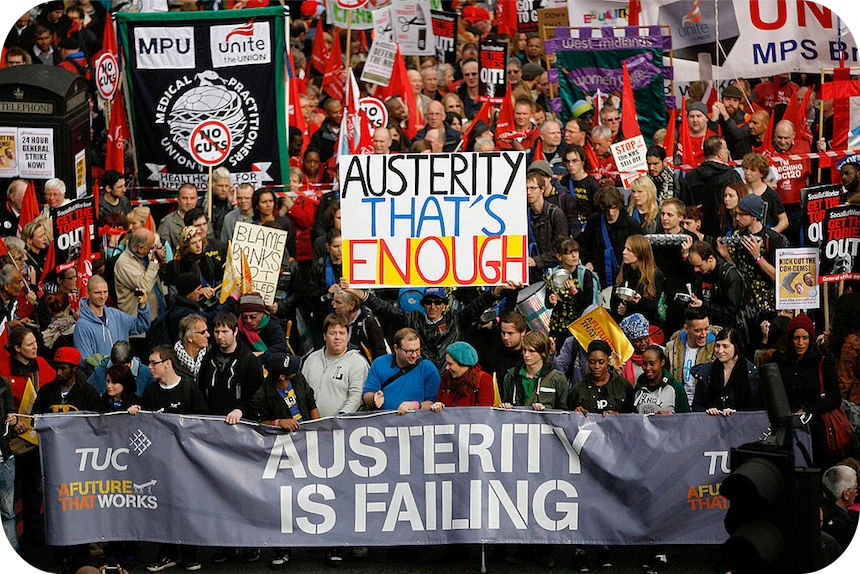War on future potholes as public transport funding cut, tax and fees to rise for drivers
$500m has been ring fenced for potholes as increased fees and tax hikes loom round the bend for drivers. Big roads will be back on track, while funding for cycling, walking and rail has been cut.
Mōrena, and welcome to The Bulletin for Tuesday, March 5, written by Anna Rawhiti-Connell.
In today’s edition: the PM is headed to Melbourne today, and is flying commercial; Auckland councillors agree to send the government a bill; Seymour reveals how much he wants to cut from the school lunch programme; but first, the goverment’s transport priorities were unveiled yesterday

$500m ringfenced for pothole prevention
According to a count undertaken by Toby Manhire in October 2022, the word pothole had appeared 69 times in local election candidate profiles on Policy.nz. He made the count after Simeon Brown launched a “pothole of the day campaign”, inviting people to submit photos of potholes and sign a petition. Yesterday, Brown unveiled the draft version of the Government Policy Statement (GPS) on land transport, which will now go out for consultation. $500m will be ringfenced for pothole prevention. Roads of National Significance (RONs) are back, with 15 new roads set to be delivered under the programme, although uncosted, with the draft plan highlighting the need to look to private investment and tolling revenue. The Herald has previously reported (paywalled) those roads were over budget by as much as $24b. As interest.co.nz’s Dan Brunskill notes, eight of the RONs would be connected to Auckland and three would be in the South Island. Environment Canterbury councillor Deon Swigg said on LinkedIn that he feels like the South Island “just is not a priority for this government”, noting the reduction in public transport funding and the number of projects within the South Island.
Funding for cycling, walking and public transport initiatives cut
As the Herald’s Thomas Coughlan reports, Labour planned to spend up to $3.2b on public transport infrastructure over the next three years. This has been cut by nearly $1b. Transport spokesperson for the Greens, Julie Anne Genter, described the plan as “extreme”. “It’s doubling down on the failed approach of last century and it will lead to more emissions, more congestion and higher transport costs for all of New Zealand,” she said.
Excise tax and rego fee increases
National scrapped the Auckland Regional Fuel Tax a few weeks ago. That ends in June. At the time, they said it would lower the cost of filling a Toyota Corolla by $5.75. Calculations by Stuff’s Glenn McConnell suggest Toyota Corolla owners in Auckland have about two and a half years to enjoy that saving. Despite criticising Labour for its plans to lift the fuel tax by 2026, National has done the same, with a later start date. As Brunskill writes, at the time, National said it could deliver its transport plan without the “heavy burden” of petrol tax hikes in its first term. “It did not say it would merely delay the hikes, nor that it would significantly increase motor vehicle registration fees,” he writes. There will a 12 cent increase to the fuel excise tax in 2027 with a further increase by 6c a litre in 2028 and 4c a litre each following year. In Coughlan’s report this morning, he notes that Brown doesn’t anticipate fuel taxes sticking around forever, with road user charges on the slate.
More cost of living crunch
Car owners will also pay an additional $25 next year in registration fees. That will rise by a further $25 in 2026. Brown said fees haven’t risen since 1994. The fines and demerit points fee regimes will also be reviewed. As the draft GPS notes, most of these have not been reviewed since they were set in 1999. To bring our fines for not wearing in seatbelt in line with Australia, the draft plan notes the fine would need to triple. Labour leader Chris Hipkins said the increase in fuel tax would be a "massive blow" to low-income households. Hipkins said the excise tax increase and increases to vehicle registration fees amounted to the government breaking its “no new taxes” promises. The cost of running a car, keeping it legal and getting a license has been noted as a barrier to employment opportunities, particularly for young people and particularly in rural areas which don’t often have reliable, late night or wide-ranging public transport options. Driver licensing fees went up last year for learner and restricted licenses, but the cost of resitting your tests was waived.
Financial support from our audience is essential to ensuring our work continues
Whether it’s a shocking and consquential announcement or rats are taking over our supermarkets, we know our community comes to The Spinoff to make sense of the world in the best and worst of times. We're committed to telling stories about Aotearoa, for Aotearoa, with rigour, range and humour. If that’s something you value, we’d love for you to consider becoming a Spinoff member or donating. If you're reading this and are already support us, a huge thank you from all of us.
Mad Chapman, Editor
PM headed to Asean Summit, flying commercial
Prime minister Christopher Luxon is heading to Melbourne today for the Asean-Australia Special Summit. As Newsroom’s Laura Walters reports, it will be a flying visit for 48 hours to engage in diplomacy with Asian leaders. Luxon was invited to attend by Australian prime minister Anthony Albanese. Walters writes that the various meetings will allow Luxon to “communicate his key message: New Zealand is open for business.” Walters notes that pressing the flesh and meeting leaders from Indonesia, Singapore, Malaysia, Thailand, Vietnam, and the Philippines are key to diversifying our trading relationship with Asian countries. As RNZ’s Anneke Smith reports, Luxon will miss two meetings as the Defence Force plane he and reporters were meant to be taking has a maintenance issue. Luxon will fly commercial to Melbourne and is on his way.
Auckland councillors agree to send the government a bill
Auckland councillors have voted in favour of mayor Wayne Brown writing the government a letter asking it to pay rates on its Auckland properties and return GST on council rates and new-build houses. As Newsroom’s Matthew Scott reports, it’s a recommendation made by the 2023 Future for Local Government review. The government has already binned one of the recommendations, killing the bill in late January that would have lowered the voting age in local government elections to 16. Housing and infrastructure minister Chris Bishop did say last week that the government was considering sharing a portion of GST revenue with councils.
Click and Collect
More on school lunches: David Seymour says he’s looking to cut the programme’s funding within the ballpark of 30-50%.
Auckland Airport denies queues are getting worse as Helen Clark says they are and its damaging the country's reputation.
Related: The Post’s Andrea Vance tried to get answers on why security screening checkpoints were so long earlier this month and, as with the queues, did not get far, very slowly.
Billionaire Peter Thiel’s company appealed a decision by the Queenstown Lakes District Council to decline consent for his luxury lodge. The hearing began yesterday.
The US Supreme Court has ruled Donald Trump can stay on state primary ballots, overturning a Colorado Supreme Court ruling that said the former president could not run because he had engaged in insurrection during the attack on the US Capitol.
March 5 is Super Tuesday in the US. Here’s an explainer on one of the most important dates on the U.S. political calendar.
Feeling clever? Click here to play 1Q, Aotearoa’s newest, shortest daily quiz.
I explain why recent history has led to politicians not wanting the word ‘austerity’ said out loud. Madeleine Holden read yet another study about toddlers, screen time and language development, and it sent her off the deep end. Joel MacManus went to the Newtown Festival and says it’s “the promise of what Wellington could be”. Tommy de Silva attends an Auckland Museum board meeting to hear about ‘PC snowflakes’ and a new lighting protocol. Karlo Mila kindly allows us to publish her poem for Fa’anānā Efeso Collins.
Sporting snippets
The women's Super Rugby Aupiki team Hurricanes Poua start season with a new haka calling out the government.
More medals for New Zealand at the World Indoor Athletics Championships as George Beamish wins gold in the Men's 1500m final (great finish line shot).
Got some feedback about The Bulletin, or anything in the news? Get in touch with me at thebulletin@thespinoff.co.nz.
If you liked what you read today, share The Bulletin with friends, family and colleagues.











In all this discussion about pot holes and deferred road maintenance there has been little mention of the deleterious effects of heavy trucks on the condition of roads throughout Aotearoa New Zealand.
I live in Matamata and usually visit Tauranga once or twice a month. I travelled there last Wednesday and on a return journey which took about 1 and a half hours I encountered 163 heavy trucks. I counted only those trucks with more than three axles. Based on this count, a 12 hour day might expect to see the passage of up to 1200 of these vehicles over this same stretch of road. It is seldom mentioned in the media that, in 2014 the National government at the time allowed for an increase in the maximum laden weight of heavy trucks from 46 tonnes to 55 tonnes. What consideration has been given to the damaging effect of this increase on the condition of roads. Much of the roading in the Waikato is constructed on sub strates which were formerly swampland and the the establishment of a secure base for strong roading is a constatnt battle for roading maintenance contractors. My observation during my journey to Tauranga is that approximately 25% of the heavy vehicles were transporting pine logs. A low profit product which could easily be transported to the port at Tauranga using the rail line through the Kaimai tunnel. Imagine the effect on a road of two maximum weighted trucks passing in opposite directions at 100 kmph. Sealed roads are not rigid surfaces but, are flexible and elastic, and vehicles create what is the equivalent of a 'bow wave' effect as they move. This is an extreme effect where the vehicles are of such high weight and aggravate the destruction of the sealed surface.
The Minister of transport has made no mention of the future of rail in the provision of transport services. I know the heavy transport lobby is a powerful donor to the political right and the potential for rail development has been down played for years. It does not provide the lucrative related activities which go with motor transport. Vehicle sellers,Fuel industries, Tyre manufacture, parts and repairs registration fees etc. Railway by comparison has few of these lucrative activities associated with its activities. What is more concerning for right wing governments is of course that its work force is traditionally 'Unionised'. The Coalition government's conversation on increasing road taxes make no mention of the disproportionately higher damaging effects on roads of heavy transport vehicles, whereas the passage of 100 cars would not cause the surface damage of even one heavily laden truck.
Anna Rawhiti-Connell today describes Austerity thus: "In the political economy, austerity is a term to describe limiting government spending". In my view this is a very limited definition and very much the one that politicians would like us to believe, referencing as it does, apparently self-evident but actually false virtues of 'balancing the books' and 'return to surplus'.
The Keynesian ideas of government taking an active role in the economy to promote public well-being and regulate cycles of 'boom and bust' pulled the USA out of the long recession of the 1930's and created a great deal of valuable infrastructure, such as hydro-electric power generation, whereas the failure of, say, the UK to adopt actively expansive policy since the 2008 GFC has resulted in 15 years of stagnation, falling real wages & falling standards of public services.
While this simplistic definition of austerity may well be favoured by the neoclassical economists who have had the upper hand in public policy and academia for the last forty years, in the view of many commentators, austerity is a trifecta, & fiscal (tax and spend) policy is only one part of it. Austerity is a political weapon in the war against broad-based, democratic, economically active government. The second part is unemployment to enforce industrial discipline through fear of destitution. Note that the pursuit of higher unemployment expressed by the RBNZ as an economic measure to lower inflation at the same time as the government engages in 'beneficiary bashing' is clear evidence of the political nature of the policy. Thirdly, the curtailing of money-creation (either directly or through bond issuance) for public purpose completes the package designed to shrink the role of government as an ideological goal. This is why it's called 'political economy', & not just 'economics'.